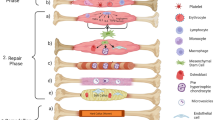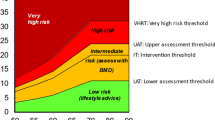Abstract
Summary
Bisphosphonates are commonly used in osteoporosis, but concerns have been raised about possible negative effects on fracture healing. We systematically reviewed the literature and found that bisphosphonates significantly prolong union times of distal radius fractures but not femoral fractures. The timing of bisphosphonate introduction does not affect fracture union time.
Introduction
Bisphosphonates are the most commonly prescribed drugs in patients suffering from and at higher risk of developing osteoporosis. However, concerns have been raised as to whether these drugs have a negative effect on fracture healing. The aim of this systematic review is to explore further these concerns.
Methods
A literature review was performed in line with the Preferred Reporting Items for Systematic Reviews and Meta-Analyses (PRISMA) guidelines. All relevant articles found via MEDLINE, Cochrane, CINAHL, EMBASE and Google Scholar were screened. Studies with information on bisphosphonates’ effect on fracture healing in humans were included and systematically reviewed.
Results
Patients with distal radius fractures on bisphosphonates had a significantly longer union time compared with controls, but not patients with femoral fractures. No correlation between timing of bisphosphonate introduction and union time for fractures was found. Although one study reported a higher humeral non-union associated with bisphosphonate introduction following the fracture, there was no evidence that bisphosphonate introduction, timing or dose resulted in a significant delay in union following other fractures.
Conclusions
This systematic review has shown that bisphosphonates significantly prolong union times of distal radius fractures. Some clinical findings are in contrast with preclinical studies highlighting the need to develop better animal models to study osteoporosis, treatment and fracture healing. There is also a need for more well-constructed studies looking at the clinical effect of bisphosphonate on fracture healing in a large number of patients. These robust studies need to look at union time and non-union rates as a function of duration and dose of different bisphosphonates in different upper and lower limb fractures.


Similar content being viewed by others
References
Drake MT, Clarke BL, Khosla S (2008) Bisphosphonates: mechanism of action and role in clinical practice. Mayo Clin Proc 83(9):1032–1045
Russell RGG (2011) Bisphosphonates: the first 40 years. Bone 49(1):2–19
Russell RGG, Mühlbauer RC, Bisaz S, Williams DA, Fleisch H (1970) The influence of pyrophosphate, condensed phosphates, phosphonates and other phosphate compounds on the dissolution of hydroxyapatite in vitro and on bone resorption induced by parathyroid hormone in tissue culture and in thyroparathyroidectomised rats. Calcif Tissue Res 6:183–196
Plotkin LI, Weinstein RS, Parfitt AM, Roberson PK, Manolagas SC, Bellido T (1999) Prevention of osteocyte and osteoblast apoptosis by bisphosphonates and calcitonin. J Clin Investig 104(10):1363–1374
Einhorn TA (1998) The cell and molecular biology of fracture healing. Clin Orthop Relat Res 355:S7–S21
Lin JH (1996) Bisphosphonates: a review of their pharmakokinetic properties. Bone 2(18):75–85
Gertz BJ, Holland SD, Kline WF, Matuszewski BK, Porras AG (1993) Clinical-pharmacology of alendronate sodium. Osteoporos Int 3:S13–S16
Cohen A, Addesso V, McMahon DJ, Staron RB, Namerow P, Maybaum S, Mancini D, Shane E (2006) Discontinuing antiresorptive therapy one year after cardiac transplantation: effect on bone density and bone turnover. Transplantation 81(5):686–691
Abrahamsen B (2010) Adverse effects of bisphosphonates. Calcif Tissue Int 86(6):421–435
Ing-Lorenzini K, Desmeules J, Plachta O, Suva D, Dayer P, Peter R (2009) Low-energy femoral fractures associated with the long-term use of bisphosphonates a case series from a swiss university hospital. Drug Saf 32(9):775–785
Neviaser AS, Lane JM, Lenart BA, Edobor-Osula F, Lorich DG (2008) Low-energy femoral shaft fractures associated with alendronate use. J Orthop Trauma 22(5):346–350
Lenart BA, Lorich DG, Lane JM (2008) Atypical fractures of the femoral diaphysis in postmenopausal women taking alendronate. N Engl J Med 358(12):1304–1306
Kwek EBK, Goh SK, Koh JSB, Png MA, Sen Howe T (2008) An emerging pattern of subtrochanteric stress fractures: a long-term complication of alendronate therapy? Inj-Int J Care Inj 39(2):224–231
Odvina CV, Zerwekh JE, Rao DS, Maalouf N, Gottschalk FA, Pak CYC (2005) Severely suppressed bone turnover: a potential complication of alendronate therapy. J Clin Endocrinol Metab 90(3):1294–1301
Harding AK, Dahl A, Geijer M, Toksvig-Larsen S, Tagil M (2011) A single bisphosphonate infusion does not accelerate fracture healing in high tibial osteotomies a randomized study of 46 patients. Acta Orthop 82(4):465–470
Wang K, Moaveni A, Dowrick A, Liew S (2011) Alendronate-associated femoral insufficiency fractures and femoral stress reactions. J Orthop Surg 19(1):89–92
Colon-Emeric C, Nordsletten L, Olson S, Major N, Boonen S, Haentjens P, Mesenbrink P, Magaziner J, Adachi J, Lyles KW, Hyldstrup L, Bucci-Rechtweg C, Recknor C (2011) Association between timing of zoledronic acid infusion and hip fracture healing. Osteoporos Int 22(8):2329–2336
Prasarn ML, Ahn J, Helfet DL, Lane JM, Lorich DG (2012) Bisphosphonate-associated femur fractures have high complication rates with operative fixation. Clin Orthop Relat Res 470(8):2295–2301
Armamento-Villareal R, Napoli N, Diemer K, Watkins M, Civitelli R, Teitelbaum S, Novack D (2009) Bone turnover in bone biopsies of patients with low-energy cortical fractures receiving bisphosphonates: a case series. Calcif Tissue Int 85(1):37–44
Rozental TD, Vazquez MA, Chacko AT, Ayogu N, Bouxsein ML (2009) Comparison of radiographic fracture healing in the distal radius for patients on and off bisphosphonate therapy. J Hand Surg [Am] 34A(4):595–602
Lin TL, Wang SJ, Fong YC, Hsu CJ, Hsu HC, Tsai CH (2013) Discontinuation of alendronate and administration of bone-forming agents after surgical nailing may promote union of atypical femoral fractures in patients on long-term alendronate therapy. BMC Res Notes 6:11
Gong HS, Song CH, Lee YH, Rhee SH, Lee HJ, Baek GH (2012) Early initiation of bisphosphonate does not affect healing and outcomes of volar plate fixation of osteoporotic distal radius fractures. J Bone Joint Surg Am 94:1729–1736
Egol KA, Park JH, Rosenberg ZS, Peck V, Tejwani NC (2013) Healing delayed but generally reliable after bisphosphonate-associated complete femur fractures treated with IM nails. Clin Orthop Relat Res, Symposium 472(9):2728–2734
Ha YC, Cho MR, Park KH, Kim SY, Koo KH (2010) Is surgery necessary for femoral insufficiency fractures after long-term bisphosphonate therapy? Clin Orthop Relat Res 468(12):3393–3398
Weil YA, Rivkin G, Safran O, Liebergall M, Foldes AJ (2011) The outcome of surgically treated femur fractures associated with long-term bisphosphonate use. J Trauma-Inj Infect Crit Care 71(1):186–190
Solomon DH, Hochberg MC, Mogun H, Schneeweiss S (2009) The relation between bisphosphonate use and non-union of fractures of the humerus in older adults. Osteoporos Int 20(6):895–901
Grady MK, Watson JT, Cannada LK (2012) Treatment of femoral fracture nonunion after long-term bisphosphonate use. Orthopedics 35(6):E991–E995
Kim TY, Ha YC, Kang BJ, Lee YK, Koo KH (2012) Does early administration of bisphosphonate affect fracture healing in patients with intertrochanteric fractures? J Bone Joint Surg Br Vol 94B(7):956–960
Thompson RN, Phillips JRA, McCauley SHJ, Elliott JRM, Moran CG (2012) Atypical femoral fractures and bisphosphonate treatment: experience in two large United Kingdom teaching hospitals. J Bone Joint Surg Br Vol 94B(3):385–390
Li CY, Mori S, Li JL, Kaji Y, Akiyama T, Kawanishi J, Norimatsu H (2001) Long-term effect of incadronate disodium (YM-175) on fracture healing of femoral shaft in growing rats. J Bone Miner Res 16(3):429–436
Manabe T, Mori S, Mashiba T, Kaji Y, Iwata K, Komatsubara S, Yamamoto T (2012) Effect of dosing interval duration of intermittent ibandronate treatment on the healing process of femoral osteotomy in a rat fracture model. Calcif Tissue Int 90(3):193–201
Koivukangas A, Tuukkanen J, Kippo K, Jämsä T, Hannuniemi R, Pasanen I, Väänänen K, Jalovaara P (2003) Long-term administration of clodronate does not prevent fracture healing in rats. Clin Orthop Relat Res 408:268–278
Chapman MW (1998) The effect of reamed and nonreamed intramedullary nailing on fracture healing. Clin Orthop Relat Res 355:S230–S238
Craig NJA, Maffulli N (2005) Subtrochanteric fractures: current management options. Disabil Rehabil 27(18–19):1181–1190
Duan X, Li T, Mohammed AQ, Xiang Z (2011) Reamed intramedullary nailing versus unreamed intramedullary nailing for shaft fracture of femur: a systematic literature review. Arch Orthop Trauma Surg 131(10):1445–1452
Kidd LJ, Cowling NR, Wu ACK, Kelly WL, Forwood MR (2011) Bisphosphonate treatment delays stress fracture remodeling in the rat ulna. J Orthop Res 29(12):1827–1833
Harris LJ, Tarr RR (1979) Implant failures in orthopaedic surgery. Biomater Med Devices Artif Organs 7:243–255
Umer M, Niazi AK, Hussain D, Ahmad M (2004) Treatment of acute fractures of the femoral shaft with reamed intramedullary interlocking AO nails. J Pak Med Assoc 54:423–427
Conflicts of interest
None.
Author information
Authors and Affiliations
Corresponding author
Rights and permissions
About this article
Cite this article
Molvik, H., Khan, W. Bisphosphonates and their influence on fracture healing: a systematic review. Osteoporos Int 26, 1251–1260 (2015). https://doi.org/10.1007/s00198-014-3007-8
Received:
Accepted:
Published:
Issue Date:
DOI: https://doi.org/10.1007/s00198-014-3007-8




